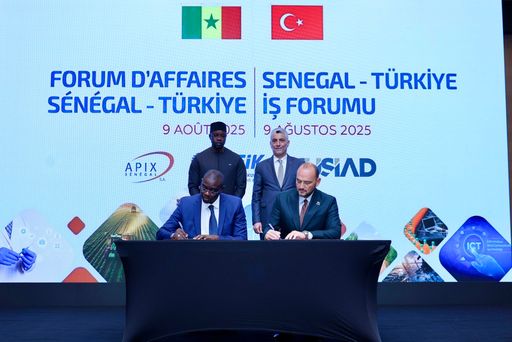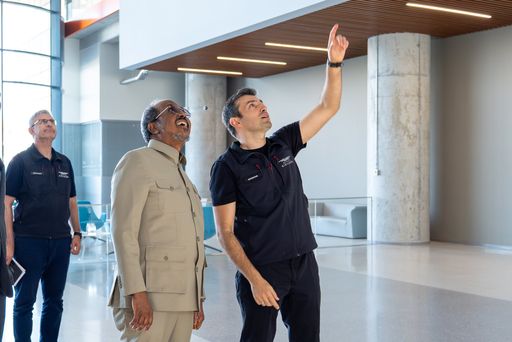When Turkish President Recep Tayyip Erdoğan landed in Mogadishu in 2011, Somalia was at its lowest ebb. Drought and conflict had pushed the East African nation of 18 million people to the brink of starvation. No leader from outside Africa had visited in nearly 20 years.
President Erdoğan's arrival wasn't just another mission driven by geopolitics and economics, but the beginning of a partnership that would rewrite the rules of engagement with Africa.
In the 14 years since, Turkish contractors have executed 2,031 projects worth US $97 billion across the continent, according to Anadolu Agency.
Turkish Airlines now touches down in 62 African cities across 41 countries. Some 62,000 African students study in Turkish universities.
From Tanzania's Standard Gauge Railway, acknowledged as the most technologically advanced rail network in Africa, to Rwanda's Kigali Convention Centre, Senegal's 50,000-seat Olympic Stadium and Blaise Diagne International Airport in Dakar, Turkish firms have helped transform Africa's infrastructural landscape.
Türkiye's cooperation with the continent doesn't end with concrete and steel. The Maarif Foundation now runs schools in 27 African countries.
President Erdoğan has made 53 visits to 31 African countries, making him the only world leader to have travelled so extensively within the continent. Ankara believes its approach rests on shared history, mutual understanding and partnerships where both sides benefit, contrary to Western countries’ approach fixed on colonial history and condescending attitudes.
Differentiating factors
"Africa has tremendous potential. It's the richest continent in terms of resources. With Türkiye's willingness to share its know-how and openness to establishing a deeper presence in Africa, the continent has the opportunity to leverage it as the preferred partner among many competitors," Ibrahim Mukhtar, an expert in Turkish-African relations, tells TRT Afrika.
Turkish diplomat, scholar and author, Prof Ahmet Kavas, sees the relationship working differently from traditional partnerships.
"It's a win-win relationship with Africa. Türkiye wins as it makes other countries win. Often, Africa gets the least when engaging with other countries. There must be a balance, which means 50:50, or at least 40:60. For Africa, it is mostly not even 10%. European and some Asian countries are there for raw materials," he explains.

Somalia case study
Somalia's expanding cooperation with Türkiye shows how this relationship works.
"I believe Somalia has the potential to gain a different power with its resources," Erdoğan had said during his 2011 visit.
What followed was one of Türkiye's most significant humanitarian efforts, which quickly expanded into broader cooperation.
Mukhtar, who has watched this unfold first-hand, believes Türkiye has made sterling contributions to building capacity across Africa. "Türkiye has taken part in rebuilding and supporting government institutions after years of civil war. These institutions range from ministries to parliament. Türkiye doesn't shy away from doing that," he says.
Last year, Türkiye signed an agreement with Somalia to equip, reconstruct and train the Somalian navy. This was an extension of Camp TURKSOM, the $50 million military base Türkiye established in Mogadishu in 2017 to train Somali forces.
Centuries of connection
Turkish links with Africa go back to the Ottoman Empire, particularly in North and East Africa. During the 1960s, as African nations gained independence, Türkiye recognised the new states and supported decolonisation.
The evolution of this relationship took off when Ankara declared 2005 "The Year of Africa".
"Following the launch, Türkiye took it as an opportunity to develop our relations with the African continent. We have been in Africa for almost 20 years. We had only twelve embassies on the continent in 2009. Currently, Türkiye has 44 missions, making it the fourth in terms of diplomatic representation in Africa after China, which has 52, the US with 50, and France with 47," explains Prof Kavas.

The African Union made Türkiye a strategic partner in 2008. Since then, African nations have increased their embassies in Türkiye from 10 to 38, as of 2024, while the number of Turkish embassies in African countries grew from 12 in 2002 to 44 in 2024. The number of mutual high-level visits in the last five years alone has exceeded 500.
Turkish agencies like TIKA, DSİ, Türkiye Diyanet Foundation and Turkish Red Crescent have built hundreds of wells across Nigeria, Ethiopia, Sudan, Mali, Burkina Faso and Somalia.
Turkish Cooperation and Coordination Agency (TİKA) has 22 offices in Africa and has carried out projects in many fields, such as health and agriculture, on the continent. A total of 1,884 projects were implemented between 2017 and 2022, the agency said.
It opened its first office in Ethiopia in 2005, and has since expanded its operations to all African countries, supporting many ‘‘projects aimed at Africa's development’’, including maternal and infant health.
Projects carried out by TİKA include the Libya Physiotherapy Hospital, Somalia's Recep Tayyip Erdoğan Hospital, the Niger-Türkiye Friendship Hospital and the Nyala Turkish Training and Research Hospital in Sudan. TİKA also supported the health sector in Africa during the Covid-19 pandemic.
In Uganda, the Turkish Red Crescent installed 20 solar-powered wells for Kayunga households. In Djibouti, DSİ built the Ambouli Friendship Dam to control flooding and support farming.
Trade tells the story
Trade between Türkiye and African nations soared from $4.3 billion in 2002 to $36.6 billion by the end of 2024, marking a nine-fold increase, according to Anadolu Agency.
Turkish investments in Africa grew from $67 million in 2003 to $10 billion in 2024, while Turkish contractors have undertaken 2,031 projects worth $97 billion across the continent.
"Right now, Africa's main exports to Türkiye are commodities and agricultural products, while Türkiye exports mainly manufactured goods. The potential for other African states exists," Mukhtar tells TRT Afrika.
Turkish companies continue to execute large projects in many countries of the continent, including South Africa, Libya, Sudan, Burkina Faso, Togo and The Gambia.
Defence partnerships
With security concerns mounting across Africa, Türkiye has also become a significant defence partner.
"Türkiye has played an important role in supporting African governments over the past decade, adopting an approach that should be lauded. Whenever Türkiye takes part in stabilising or sending military equipment or forces into an African territory, they do so with the consent of the central government," says Mukhtar.
Turkish defence and aerospace exports hit a record $5.5 billion in 2023, up 27% from the previous year. African countries' share in this growth has also grown exponentially.
Education opens doors
Education anchors Türkiye's approach, with at least 62,000 African students studying in Türkiye as of the end of 2024, mostly on Turkish government scholarships, according to data from Anadolu Agency.
"Türkiye attaches great importance to education. Currently, we have about 340,000 international students in Türkiye, of which at least 18% are African. We have Maarif schools in Africa where approximately 20,000 young African children study," says Prof Kavas.
The Maarif Foundation runs more than 230 institutions in 27 African nations. The Yunus Emre Institute provides Turkish language and cultural programmes in 18 centres across 15 countries.
Nasir Abu Machano, managing director of Izmir Pharmacy Ltd in Tanzania and the Izmir Group overseas, first arrived in Türkiye on an IDB scholarship after finishing high school in Zanzibar.
Language proved a hurdle, but the warmth with which he was welcomed is something he remains grateful for to this day.
"We found the Turkish people very friendly. They helped us in so many ways. They understood that these are foreigners and helped us to fit into their world," recalls Machano.
He met his future wife in Izmir and returned to Tanzania in 2007, naming his company after the city where he studied.
"Izmir Pharmacy has expanded to mainland Tanzania, creating jobs for many young people. When we returned from Türkiye to Zanzibar, there weren't that many pharmacies. There were maybe just seven of them doing wholesale, not community pharmacies," he tells TRT Afrika.
Analysts see Türkiye's ties with African countries deepening, thanks to an approach that encompasses people, partnerships and transformation over the long term rather than just economic cooperation.
The relationship has already moved beyond traditional development models. African nations gain new pathways to development while Türkiye expands its global reach through partnerships built on mutual benefit.



















